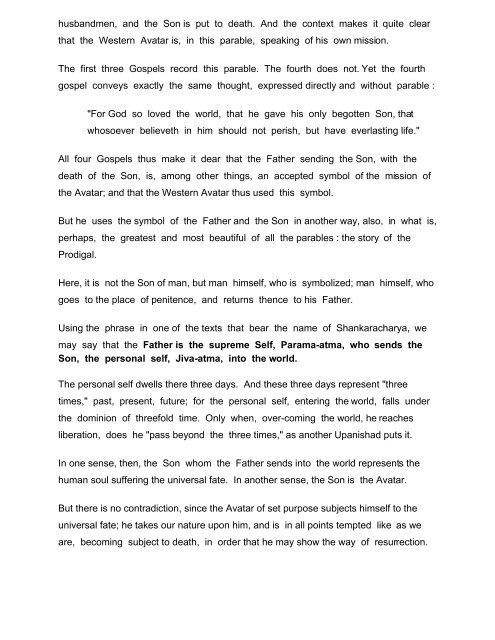KathaUpanishad
You also want an ePaper? Increase the reach of your titles
YUMPU automatically turns print PDFs into web optimized ePapers that Google loves.
husbandmen, and the Son is put to death. And the context makes it quite clear<br />
that the Western Avatar is, in this parable, speaking of his own mission.<br />
The first three Gospels record this parable. The fourth does not. Yet the fourth<br />
gospel conveys exactly the same thought, expressed directly and without parable :<br />
"For God so loved the world, that he gave his only begotten Son, that<br />
whosoever believeth in him should not perish, but have everlasting life."<br />
All four Gospels thus make it dear that the Father sending the Son, with the<br />
death of the Son, is, among other things, an accepted symbol of the mission of<br />
the Avatar; and that the Western Avatar thus used this symbol.<br />
But he uses the symbol of the Father and the Son in another way, also, in what is,<br />
perhaps, the greatest and most beautiful of all the parables : the story of the<br />
Prodigal.<br />
Here, it is not the Son of man, but man himself, who is symbolized; man himself, who<br />
goes to the place of penitence, and returns thence to his Father.<br />
Using the phrase in one of the texts that bear the name of Shankaracharya, we<br />
may say that the Father is the supreme Self, Parama-atma, who sends the<br />
Son, the personal self, Jiva-atma, into the world.<br />
The personal self dwells there three days. And these three days represent "three<br />
times," past, present, future; for the personal self, entering the world, falls under<br />
the dominion of threefold time. Only when, over-coming the world, he reaches<br />
liberation, does he "pass beyond the three times," as another Upanishad puts it.<br />
In one sense, then, the Son whom the Father sends into the world represents the<br />
human soul suffering the universal fate. In another sense, the Son is the Avatar.<br />
But there is no contradiction, since the Avatar of set purpose subjects himself to the<br />
universal fate; he takes our nature upon him, and is in all points tempted like as we<br />
are, becoming subject to death, in order that he may show the way of resurrection.


















